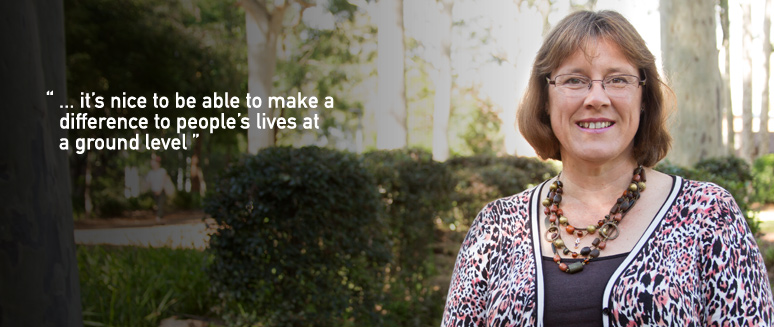Researcher Highlights
Lifelong learning
Dr Bronwyn Relf
A big believer in the benefits of tertiary study, Dr Bronwyn Relf is looking to see what works – and what doesn’t work – within enabling education spaces in Australia.

At the heart of Dr Bronwyn Relf’s research are students – near and far, young and old, eager and unsure. The passionate scholar puts their needs at the centre of her work at the University of Newcastle’s (UON) Centre for English Language and Foundation Studies, resolutely vowing to help bridge the widening gap between secondary school and tertiary education.
“Failing to complete the HSC or receiving a near-miss ATAR doesn’t automatically spell the end of a student career,” she affirms.
“Enabling programs exist as alternate pathways into university.”
“Enrolments in them are on the increase, which is really pleasing.”
Focused on calculated and cutting-edge curriculum design, Bronwyn’s studies are spurred on by her strong conviction that good enabling curriculum design enhances widening participation.
“I think it’s vital that we define what makes these ‘university-ready’ courses unique, special and necessary,” she comments.
“My job isn’t high-flying, but it’s nice to be able to make a difference to people’s lives at a ground level.”
Sheep, koalas and starfish
Bronwyn took a “very roundabout route” to get to this point, beginning her celebrated career with a PhD in Molecular Biology in 1991. Awarded a scholarship by the University of Western Sydney (UWS) (now known as Western Sydney University) and the CSIRO to undertake the study, the savvy scientist sought to identify the genes involved in wool growth.
“I stayed on as a researcher and teacher at UWS after completing my candidature in 1999,” she recalls.
“While there, I investigated the antimicrobial proteins that are found in the pouches of koalas.”
“I also took a postdoctoral position at The Children’s Hospital at Westmead where I looked at the genes associated with sleep apnoea and obesity in infants.”
“It was a large-scale project undertaken both here and in the Philippines.”
As fascinating as it is full, Bronwyn’s resume includes two stints at the University of Sydney as well.
“I was responsible for isolating specific molecules, called ‘growth factors,’ from the nerve cords of native Australian starfish,” she explains.
“That work resulted in a publication, which I’m exceptionally proud of.”
Doughnuts and dinosaurs
Swiftly transitioning to educational research in 2010, Bronwyn moved to Newcastle to tackle a Graduate Certificate in the Practice of Tertiary Teaching. During that time, the accomplished academic was employed on a sessional basis in UON’s Open Foundation program.
“It was a wonderful opportunity as it enabled me to combine my primary interests – biology and lecturing,” she asserts.
“What I could therefore do, and can continue to do, is explain scientific concepts in fun and unusual ways, such as with ‘Doughnuts and Dinosaurs.’”
“The doughnuts are red blood cells, the dinosaurs are the antibodies that can destroy the cells if you have an incorrect transfusion, and the jelly babies are the proteins, or antigens, on these cells.”
“All are colour-coded to represent different blood types.”
“I like making science relevant – everyone can relate to food!”
The “best possible”
Now a full-time Associate Lecturer at the Centre for English Language and Foundation Studies, Bronwyn is busy pioneering a handful of exciting research endeavours.
“I’m collaborating with Cathy Burgess on a project that examines the effectiveness of my ‘Science for Nursing and Midwifery’ course curriculum,” she shares.
“Part of my current work is looking at maths anxiety too.”
“Both of these are focused on making Open Foundation experiences the best they can be so that students are equipped with enough skills and knowledge to successfully complete undergraduate degrees and acquire a lifelong love of learning.”
Another feather to her already impressive cap, Bronwyn is heading up a team with Associate Professor Mahsood Shah and Dr Barry Hodges on the Office for Learning and Teaching project “Lighting the Path(way): articulating curriculum design principles for open access enabling programs”. The initiative will see the experts from UON work with other researchers at Edith Cowan University and the University of Tasmania to articulate the goals for curriculum design in Open Foundation courses.
“We want to do this because nobody has defined what makes up a really good enabling program,” she insists.
“This is despite there being constant talk about student retention and attrition.”
“Our research will hopefully help to inform policy and practice.”
The University of Newcastle acknowledges the traditional custodians of the lands within our footprint areas: Awabakal, Darkinjung, Biripai, Worimi, Wonnarua, and Eora Nations. We also pay respect to the wisdom of our Elders past and present.
